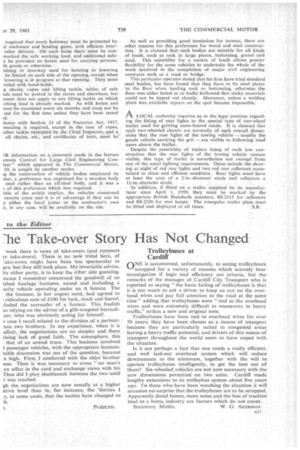Trolleybuses at Cardiff
Page 55

If you've noticed an error in this article please click here to report it so we can fix it.
nNE is accustomed, unfortunately, to seeing trolleybusek `-'scrapped for a variety of reasons which scarcely bear investigation if logic and efficiency are criteria, but the, remarks of the manager of Cardiff City Transport who is reported as saying "the basic failing of trolleybuses is that it is too much to ask a driver to keep an eye on the overhead wires and pay full attention to the road at the same time" adding that trolleybuses were "tied to the overhead wires and were extremely difficult to manceuvre in heavy traffic," strikes a new and original note.
Trolleybuses have been tied to overhead wires for over 50 years; they have beeff chosen as a means of transport because they are particularly suited to congested areas having a heavy traffic potential, and drivers of this means of transport throughout the world seem to have coped with the situation.
Is it not perhaps a fact that one needs a really efficient, and well laid-out overhead system which will reduce dewirements to the minimum, together with the will to operate trolleybuses intelligently, to get the best out of them? Six-wheeled vehicles are not now necessary with the new dimensions permitted on two axles. Cardiff made lengthy extensions to its trolleybus system about five years ago. To those who have been watching the situation it will occasion no surprise that the trolleybuses are to be scrapped. Apparently diesel fumes, more noise and the loss of tractiort load to a home industry are factors which do not count.
Stanmore, Middx. W. G. AKERMAN.




























































































